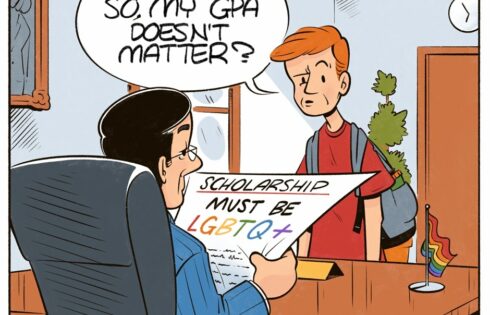
 A new bill was introduced recently to Congress that would expand the scope of requirements under the Clery Act, which governs sexual assault prevention efforts on college campuses. But investigations launched by the Department of Education and the FBI reveal that the federal government has already strengthened its enforcement of existing provisions of the law.
A new bill was introduced recently to Congress that would expand the scope of requirements under the Clery Act, which governs sexual assault prevention efforts on college campuses. But investigations launched by the Department of Education and the FBI reveal that the federal government has already strengthened its enforcement of existing provisions of the law.
That means some universities—chosen at random—will have to pay up.
A joint investigation launched by the Department of Education and the Federal Bureau of Investigation determined that the University of Vermont, Washington State University, and the University of Northern Iowa were in violation of the Clery Act, according to Inside Higher Ed. The infractions involved improper records-keeping of sexual assault and crime statistics on the part of the universities, and could come with fines of up to $27,500 per infraction. The Administrative Actions and Appeals Division, which will decide whether to issue fines, did not respond to a request for comment.
The investigations signal a shift in the federal government’s attitude toward enforcement of the Clery Act. S. Daniel Carter, director of public policy for Security on Campus, a victim’s rights and crime prevention organization, noted that almost all prior investigations had been prompted by incidents or complaints made on specific campuses.
These three universities, however, were picked at random.
“We asked several times when we received the notice in the spring of 2009, was there a complaint?” said Gary Derr, vice president for executive operation at UVM. “They said, ‘No, you were just randomly selected from institutions in the country to see how you were doing with complying.’”
After the conclusion of the investigation, university administrators sat down for an un-official meeting with the reviewers to see what changes needed to be made. By the time UVM received a formal letter with the investigation’s findings—almost a year later, in May of 2010—the university had already implemented the changes.
WSU also changed its policies in order to comply with the findings of the investigation.
“On all of the issues raised, this university has corrected these errors and adjusted policies and procedures to ensure future compliance,” wrote Darin Watkins, executive director of external communications for WSU.
The University of Northern Iowa did not respond to a request for comment.
But even though the errors were corrected, the universities may still be fined. Derr hopes that won’t happen. If it does, UVM may challenge the decision.
“I think, frankly, if it comes back with some attempt at fining us, I think yeah we might,” he said.
At issue for UVM is whether the infractions were as serious as investigators claimed. While the university was charged with five violations relating to inadequate reporting of sexual violence on campus, two of the infractions were labeled “serious.” Of these, one was for failing to put the entire URL code of the university’s sexual assault report in a campus-wide e-mail. Instead, the e-mail included the message ‘For the full report, click here,’ which hyperlinked to the report.
“They said that was a violation because the full URL listing should have been there, not just a simple link,” Derr said.
The other “serious” violation was UVM’s failure to designate sexual assaults as forcible or non-forcible, as required by law. Derr said that in cases where authorities lacked enough information to make that distinction, the incidents were not listed as forcible or non-forcible.
When asked specifically about the magnitude of this infraction, Carter pointed out that the labeling of offenses as “serious” was not due to deliberate misbehavior on the part of the university. Rather, the offenses were judged on the seriousness of their consequences.
“Because these obligations to thoroughly and accurately collect crime report information and report it consistently are the core underpinnings of the Act, failing to adhere to them is extremely serious,” he wrote.
Carter was less confident, however, that UVM’s failure to properly e-mail the sexual violence report constituted a serious violation.
“Currently, it is relatively easy to locate the ‘Clery Report’ on the UVM Police Services website, suggesting that this extra step, unlike the inaccurate statistics, is unlikely to effectively deny information to students and others,” he wrote.
He added that he would defer to the authorities since he was not privy to all the information at the time the investigation took place.
The next step is for the department to decide whether to penalize the universities. But if failing to spell out the full URL code does earn UVM a $27,500 fine, administrators will be baffled—and frustrated.
“Those are the serious violations?” Derr asked.
Like The College Fix on Facebook / Follow us on Twitter




Please join the conversation about our stories on Facebook, Twitter, Instagram, Reddit, MeWe, Rumble, Gab, Minds and Gettr.